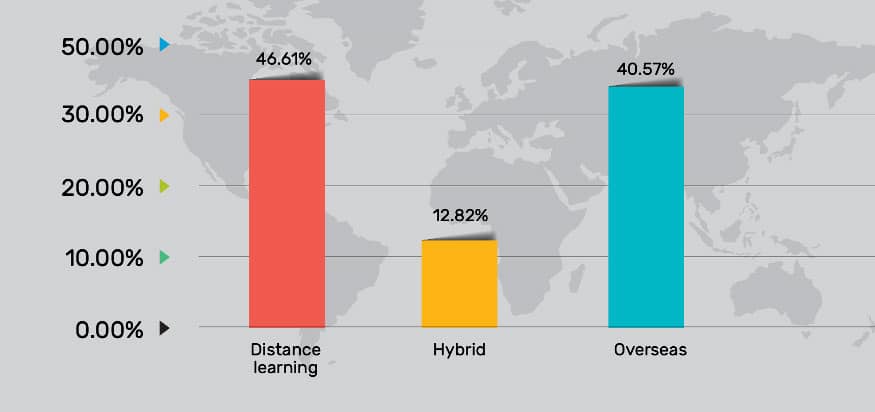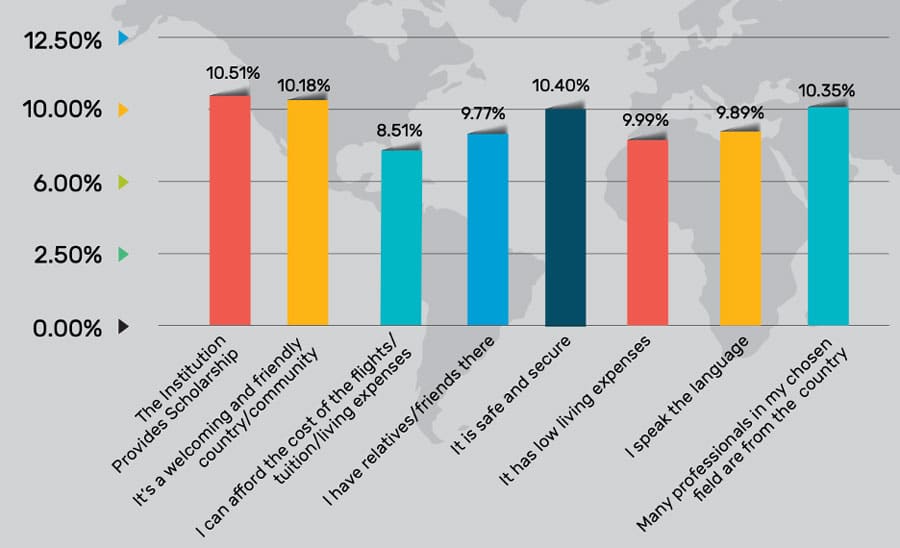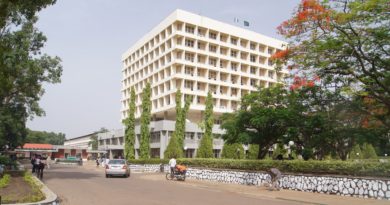Why Nigerians are spending huge amounts to study abroad
By Jesusegun Alagbe
A full nine out of every 10 Nigerian students are currently seeking opportunities to study abroad.
This is according to a The Nigeria Market Sentiments and Study Motivations Report 2022 research project produced by a consortium including the University of Sussex, a public research university in Brighton, England; Culture Intelligence from RED, a Nigeria-based think tank; and Vive Africa, a media and communications consultancy firm.
The research was conducted among 4,008 respondents. Of these, about 23% were students under 18 years of age, 49.8% were between 18 and 25 years old, 20% between 26 and 35 years old, 6.19% between 36 and 45 years old, and 1.42% above 45 years old.
About two-thirds of surveyed students were interested in undergraduate studies, while the remaining third was looking for graduate programs.
Drivers of interest in foreign education
The survey indicates that multiple factors are contributing to students’ interest in foreign education.
These include rising insecurity, including banditry, terrorism and kidnapping, seemingly never-ending university strikes, a high youth unemployment rate (42.5%, according to Nigeria’s National Bureau of Statistics), police brutality, and a persistent level of underinvestment in tertiary education compared with global standards.
What’s more, the availability of post-study work options or even permanent residency adds to the appeal for Nigerian students wanting to study abroad.
Another major reason for the interest in foreign education among young Nigerians includes improved job opportunities coupled with a perceived preference for foreign degrees by Nigerian employers.
Although Nigeria’s economy has barely grown in the past seven years since President Muhammadu Buhari took power, the country has a booming middle and elite class who value quality education, have international exposure, specific educational preferences, and a higher disposable income, and general affluence.
According to the research, the low growth of Nigeria’s economy, combined with the nation’s lack of transnational education, has triggered the preference of Nigerians to leave the country for greener pastures.
Nigerians seeking international education were found to have a strong focus on science, technology, engineering, and mathematics (STEM) which sees many students in both the undergraduate and postgraduate categories enrolled in courses such as engineering, mathematics, health professions, and more.
On the other hand, arts (fine and applied), social sciences, and other related courses remain a growing sector with less than 20% enrolment ratios.
The UK is the most preferred study destination
Since 2015, the preferred destinations for Nigerian students are the United Kingdom, followed by the United States and Malaysia.
constraints.


Thousands also study in other countries, including Turkey, Ukraine, Hungary, Finland, Cyprus, Italy, Romania, France, Ireland, Poland, Estonia, Greece, Sweden, The Netherlands, and Norway.
Despite the challenges of the COVID-19 pandemic, it is believed that about 100,000 Nigerian students were enrolled abroad in 2020.
The UK’s higher education sector reportedly emerged from the global pandemic largely unscathed as the UK continues to become an attractive and welcoming destination for international students.
According to a survey by the UK’s Higher Education Statistics Agency, for the third consecutive year in 2021, the UK achieved favored status, previously held by the US.
Nearly 30% of international students preferred Britain, 24.5% favored the US and 16.5% chose Australia, with Canada coming in fourth at 15.8%.
For the UK, applications from Nigeria were said to be up by 83%, for Pakistan by 53%, and for India by 13%.
The numbers were not surprising, the researchers noted, stating that, for decades, the UK has been a major destination due to the language and bilateral relations between Nigeria and Britain.
Affordability is a dilemma
While the UK is one of the most popular destinations for international students as it is home to some world-class institutions and culturally diverse cities, education in that country comes at a cost.

Tuition fees often exceed £10,000 (about US$12,654 or NGN5.2 million) a year even as respondents highlighted the promise of a part-time job while in school as important.
Most of the respondents said they would prefer paying tuition and other financial obligations in installments, and most also explained that they would prefer offers of scholarships from the university, their employer, or the government.
Other major considerations include personal and student loans and sponsorship by parents and family members. The study noted that affordability and ease of payment will continue to be major considerations for prospective students wishing to further their studies abroad.
Meanwhile, roughly 70% of the respondents said lecturers, academic mentors, and advisers are the biggest influencers on their school choices, while personal research by the students and an official one-on-one engagement by the institution came a close second.
‘Exciting but depressing’
The researchers noted that the demand for foreign education among Nigerian students can be described as exciting but depressing – and with no thanks to the poor quality of education available to most of them at home.
Although Buhari has promised to make significant investments in the education sector, his administration has allocated less than 10% of the nation’s annual budget to education, well below the benchmark recommended by the United Nations Educational, Scientific and Cultural Organisation (UNESCO).
Professor Ayodeji Olukoju, the pro-chancellor of Chrisland University in Abeokuta, the capital city of Ogun state in south-western Nigeria, bemoaned the “education tourism” embarked upon by many Nigerian students.
“Educational tourism results in capital flight at a time when we cannot afford it, and we are not getting a reciprocal inflow of capital.
“To be fair, sponsors of these children [seeking foreign education] are exercising their right to spend their money [as they wish], but it is harmful when considered in economic terms,” Olukoju said in a report by Guardian, a local newspaper.
“Nigeria is seriously haemorrhaging, and that flow is not sustainable. It makes us an economic and cultural appendage of the foreign recipients of our capital exports,” Olukoju added.
‘US$221 million spent … in three months’
Meanwhile, analysis of data by the Central Bank of Nigeria (CBN) showed that Nigerians spent about US$221 million on foreign education between December 2021 and February 2022.
The CBN data, according to a report by local newspaper Punch, showed that, in December 2021, Nigerians spent US$90.67 million on foreign education. In January 2022, a total of US$60,202,730.84 was spent on foreign education, while US$69.9 million was spent in February 2022.
Education analyst and vice president of Highcap Securities, David Adonri, said the amount of money exported by Nigerians to finance overseas education is staggering.
Describing the situation as an indication of the dire state of education in Nigeria, Adonri said this would be preventable if Nigeria’s educational system were to become globally competitive.
Jesusegun Alagbe is a freelance multimedia journalist, writer, and researcher from Lagos, Nigeria








![2024 Updated List of 262 Government Approved Universities in Nigeria [NEW LIST] 11 2024 Updated List of 262 Government Approved Universities in Nigeria [NEW LIST] 9](https://www.theabusites.com/wp-content/uploads/2021/09/approved-universities-in-Nigeria-130x90.jpg)